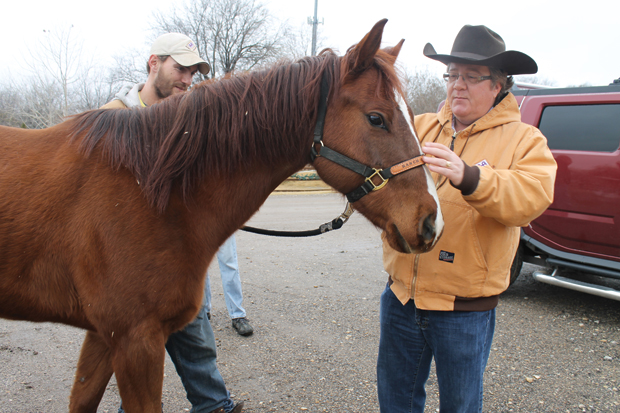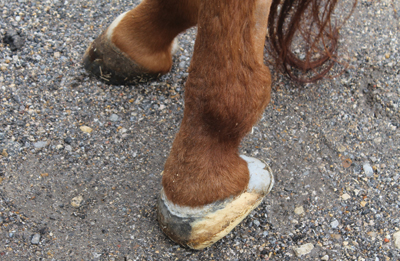Phoenix rising
Gay-run Ranch Hand Rescue continues to revolutionize veterinary medicine while saving abused animals, nurturing wounded people

HORSE?WHISPERER | Bob Williams, founder of Ranch Hand Rescue, tends to Phoenix, reportedly the first horse to receive stem-cell therapy. The cream-colored portion of Phoenix?s hoof, below, consists of regenerated tissue. (Photos by David Taffet/Dallas Voice)
CLICK HERE TO VIEW MORE PHOTOS FROM RANCH HAND RESCUE
DAVID?TAFFET? |? Staff Writer
ARGYLE, Denton County ? When Bob Williams founded Ranch Hand Rescue, he had three goals: to create a sanctuary for abused and starved farm animals, to rescue those animals with accountability and to help people.
But Williams could never have imagined that within a few years the ranch would be revolutionizing veterinary medicine while helping everyone from juvenile detainees to wounded warriors, anorexics and amputees.
After Williams suffered a stroke several years ago, he and his partner Marty Polasko moved to Argyle from California.
On their property, Polasko opened American Pet Spa & Resort to care for pets in a way that perhaps only gay people would understand ? complete with webcams for owners and swimming lessons and satellite TV for dogs.
 Meanwhile, Williams created Ranch Hand Rescue as a safe and controlled environment where animals that ordinarily would be euthanized are happily living out their lives or recovering before moving on to lives with new owners.
Meanwhile, Williams created Ranch Hand Rescue as a safe and controlled environment where animals that ordinarily would be euthanized are happily living out their lives or recovering before moving on to lives with new owners.
In a few severe cases of abuse, animals have had to be euthanized. In most cases, animals lucky enough to end up at Ranch Hand Rescue receive cutting-edge veterinary care. The latter include the first horse to be fitted with a prosthetic leg ? which made international news a few years ago ? and now, the first horse to receive stem-cell treatment.
Williams won?t euthanize animals that tell him they want to live. Yes, he communicates with the animals, usually by placing their heads to his heart and by telling them they?re safe.
And Phoenix, Williams insists, wanted to live.
?I looked into his eyes and knew he wasn?t giving up,? Williams said.
When Phoenix arrived at Ranch Hand Rescue last January, he?d suffered an injury resulting in the loss of his hoof, hoof wall and a portion of his coffin bone. The coffin bone is the small lower-most bone in a horse?s leg, just above the hoof.
A year earlier, Williams dealt with another horse with a similar problem.
Midnite, a miniature horse, has become Ranch Hand Rescue?s star. After being fitted with a prosthetic lower leg, he quickly adapted and began walking. He?s been featured on Animal Planet and helped Houston Mayor Annise Parker inaugurate a new Houston park and playground designed for children with handicaps.
Williams calls Midnite a natural and estimates the horse has met more than 10,000 people since being fitted with his new leg.
A donor recently provided a horse trailer outfitted to transport Midnite safely, and this summer Williams plans to take him on a national tour.
So when Phoenix arrived, he, too, was fitted with a prosthetic. But when Phoenix?s coffin bone rotated, the prosthetic could no longer help him.
Because he was missing about a third of the coffin bone, doctors wanted to euthanize him, which is standard practice.
Williams refused. He consulted with some of the best equine veterinarians in the country and came up with an innovative treatment.
Dr. John Bitter, an Argyle vet, operated on Phoenix?s leg using a procedure called tendon cutting. Working with a company called Nano Fiber, Bitter harvested stem cells and injected columns in the horse?s leg.
Seven months later, after spending much of that time in a cast, Phoenix walks normally wearing just an artificial shoe as the rest of the hoof regenerates. He apparently has no pain.

MINIATURE?HORSE A BIG?STAR? | Midnite, a miniature horse, made international news when he became the first to receive a prosthetic limb two years ago. (David Taffet/Dallas Voice)
Williams said this is the first time stem-cell treatment has been used in horses. He said he?s been told by experts that this could not only change veterinary medicine, but also lead to treatments for paralysis in humans and regenerating human tissue.
But saving the horse and advances in veterinary care is only part of the story for Williams.
?Our equine therapy program is so successful, we have to hire a second therapist,? Williams said.
Williams said once people connect with horses, he sees improvement sometimes on a daily basis.
?It?s extremely successful for people who don?t do well in an office [therapy] environment,? Williams said.
When news of Midnite?s successful prosthetic made news, Williams began getting calls from doctors and parents. He received numerous requests about children who were about to undergo amputation and wanted to meet the horse.
Justin Watson recently took over much of the day-to-day operation of the ranch to allow Williams more time for the extensive fundraising needed to operate the sanctuary.
Watson has been amazed at the reaction he?s seen to children interacting with Midnite.
?If this little horse can do it, then I can do it,? children often say, according to Watson.
Another staff member is Kim Mills, a licensed therapist with a certification in equine-assisted therapy.
?Horses key in to our body language,? she said. ?Horses help you see what?s going on with a person.?
Mills said that when her patients are around the animals, their defenses come down.
Among those patients are children with anorexia, who help feed emaciated animals.
?They can see their body image in the horse,? she said, adding that those in addiction recovery experience similar benefits. ?It really does seem to help.?
As a military veteran who spent 18 months in Afghanistan, Watson encourages other vets and their children to come to the ranch as part of their recovery.
?When we get back, we need sensitivity,? he said.
Those coming back from war with PTSD are always on high alert, Mills said. The animals help calm them down. But the therapy works for their children as well.
?It?s powerful for kids who wonder why mom or dad is different since coming home,? Mills said.
Some people come to the ranch afraid of horses and start with one of the miniatures, which tend to be gentler. After starting slowly, they?ll tell Mills, ?I think I want to meet a larger horse.?
Feeding and grooming animals is effective for children with low self-esteem. The ranch recently began working with the Denton County Juvenile Department.
?Their empathy really comes up quickly,? Mills said.
She said donkeys are phenomenal for people working through severe traumas, deaths or unexplained loss.
?People gravitate toward them,? she said.
But the donkeys are specific in who they choose to bond with.
Some people relate to Al, a llama who takes to certain people but doesn?t particularly like to be touched. Al helps teach people boundaries, she said. She said that Pegasus, a horse who was battered and doesn?t want to be touched in certain places, relates well to clients who?ve been abused.
Mills said working with a horse was particularly effective with one transgender client. The animal was loving and accepting. Mills said she watched as the client?s ?authentic self came out,? helping ease her transition.
In 2012, Ranch Hand Rescue took in 25 animals needing critical care. Williams calls the Denton County sheriff?s department the best in the state in following through with prosecution against animal abusers.
He was particularly disappointed in the recent outcome of a case in Collin County. Six horses were seized after being beaten and severely neglected, one was euthanized, one died and the other four took six to 13 months to rehabilitate. The Collin County District Attorney?s office prosecuted, but a jury found the abuser not guilty in October.
After a recent call from Garza County near Lubbock, one horse died before Williams arrived.
?We usually get there in time,? Williams said.
But rather than dwell on failures, Williams focuses on successes.
?Phoenix?s biggest problem is he?s stir crazy,? Williams said.
He said the horse was getting a new shoe fitting soon and they?d re-evaluate whether to give him more space to run around. Currently, Phoenix is kept in a round pen to limit his activity while the leg heals.
As the ranch?s success with rescuing farm animals in new and innovative ways grows, the waiting list for people to get into the equine assisted therapy program does too.
?Animals change us in positive ways,? Mills said.
This article appeared in the Dallas Voice print edition January 11, 2013.
Related posts:
- Gay-run Ranch Hand Rescue receives one of its most critical cases, seeks summer volunteers
- Gay-owned animal rescue needs your help
- Fundraiser set to benefit sanctuary for abused horses, other animals
- COVER STORY: a DIFFERENT kind of CAMP
- Gay-owned Ranch Hand Rescue continues saving farm animals through brutally cold weather
Source: http://www.dallasvoice.com/phoenix-rising-10136420.html
miami dolphins buffalo bills pittsburgh steelers seattle seahawks ryan tannehill cispa baltimore ravens

0 Comments:
Post a Comment
Subscribe to Post Comments [Atom]
<< Home